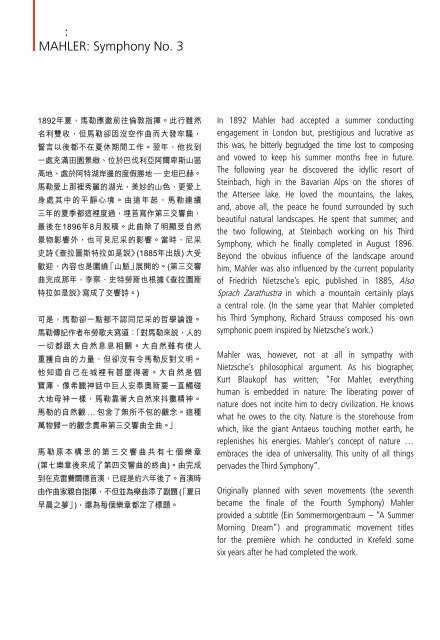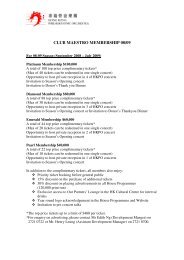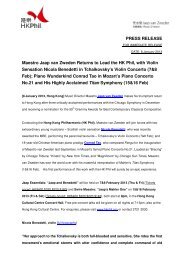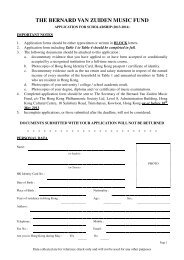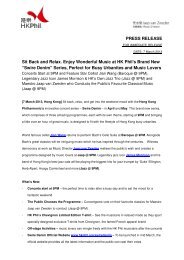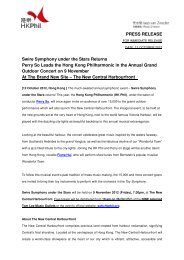10&11 - Hong Kong Philharmonic Orchestra
10&11 - Hong Kong Philharmonic Orchestra
10&11 - Hong Kong Philharmonic Orchestra
You also want an ePaper? Increase the reach of your titles
YUMPU automatically turns print PDFs into web optimized ePapers that Google loves.
MAHLER: Symphony No. 3<br />
<br />
<br />
<br />
<br />
<br />
<br />
<br />
<br />
<br />
<br />
<br />
<br />
<br />
<br />
<br />
<br />
<br />
<br />
<br />
<br />
<br />
<br />
<br />
<br />
<br />
<br />
<br />
<br />
In 1892 Mahler had accepted a summer conducting<br />
engagement in London but, prestigious and lucrative as<br />
this was, he bitterly begrudged the time lost to composing<br />
and vowed to keep his summer months free in future.<br />
The following year he discovered the idyllic resort of<br />
Steinbach, high in the Bavarian Alps on the shores of<br />
the Attersee lake. He loved the mountains, the lakes,<br />
and, above all, the peace he found surrounded by such<br />
beautiful natural landscapes. He spent that summer, and<br />
the two following, at Steinbach working on his Third<br />
Symphony, which he finally completed in August 1896.<br />
Beyond the obvious influence of the landscape around<br />
him, Mahler was also influenced by the current popularity<br />
of Friedrich Nietzsche’s epic, published in 1885, Also<br />
Sprach Zarathustra in which a mountain certainly plays<br />
a central role. (In the same year that Mahler completed<br />
his Third Symphony, Richard Strauss composed his own<br />
symphonic poem inspired by Nietzsche’s work.)<br />
Mahler was, however, not at all in sympathy with<br />
Nietzsche’s philosophical argument. As his biographer,<br />
Kurt Blaukopf has written; “For Mahler, everything<br />
human is embedded in nature. The liberating power of<br />
nature does not incite him to decry civilization. He knows<br />
what he owes to the city. Nature is the storehouse from<br />
which, like the giant Antaeus touching mother earth, he<br />
replenishes his energies. Mahler’s concept of nature …<br />
embraces the idea of universality. This unity of all things<br />
pervades the Third Symphony”.<br />
Originally planned with seven movements (the seventh<br />
became the finale of the Fourth Symphony) Mahler<br />
provided a subtitle (Ein Sommermorgentraum – “A Summer<br />
Morning Dream”) and programmatic movement titles<br />
for the première which he conducted in Krefeld some<br />
six years after he had completed the work.


